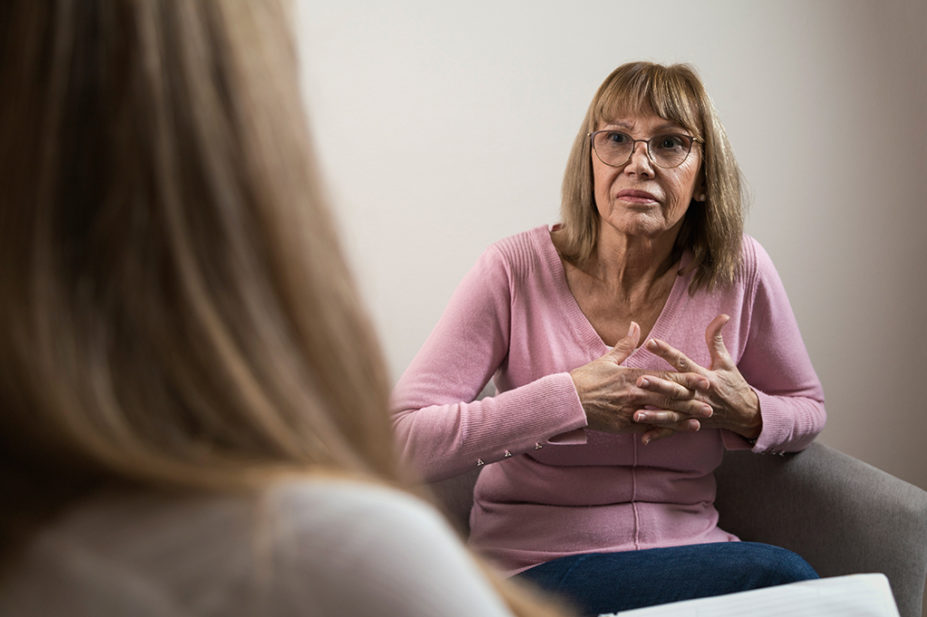
Shutterstock.com
After reading this article, you should be able to:
- Understand the different mental health conditions that are prevalent in older women and the implications they can have;
- Be able to recognise signs and symptoms of these conditions;
- Understand how pharmacists can support patients to manage their conditions.
Introduction
Later life (aged over 50 years) can be a period of transition and adjustment to loss for many women. Transitions can be caused by major life events, such as retirement and relocation, while losses may owe to chronic illnesses, ageing onset medical conditions or unexpected life events. All can contribute to a person’s wellbeing and mental health.
A significant period of transition that occurs in later life is menopause, a biological stage in a woman’s life when menstruation stops permanently. Following menopause, women are at an increased risk of mood changes, including depression and anxiety[1]. Women with a history of premenstrual syndrome and postnatal depression are at particular risk[1].
The most common mental health conditions seen in older women are anxiety and depression, which are thought to affect around one in five women in the UK[2]. Data also show that women are twice as likely to experience anxiety and depression than men[3].
It is estimated that as many as 85% of older people with depression receive no assistance from the NHS[4]. Since 2000, rates of common mental health conditions have increased steadily in women, compared with rates in men that have remained stable[5]. Evidence also suggests that women are more likely to report age-related sleep problems, with disturbed sleep being a common symptom of many mental health conditions[6]. Insomnia is associated with cognitive difficulties, including impaired memory, and attention and concentration problems, as well as a decreased quality of life and function, which includes an increased risk of falls in older people[7].
The importance of supporting women to manage both their physical and mental health has gained traction in recent years. In July 2022, the UK government published its first ‘Women’s Health Strategy for England’, a ten-year strategy that sets out a range of commitments to improve the health of women[8]. In addition, the All-Party Parliamentary Group on Menopause published its final report in October 2022 following a year-long inquiry[9]. The group makes recommendations for the UK government, NHS and other bodies to initiate change and dispel the long-held taboo around the topic[9].
Pharmacists across all sectors can provide support and expert advice on medicines use as well as wider health advice and support to women at all stages of their lives, especially when they have potential mental health concerns[10].
This article will give an overview of the mental health conditions that are most common in older women, as well as outlining opportunities for pharmacist involvement and how these conversations can be approached.
Societal factors and older women
Older women are often involved in caregiving, whether that involves raising children and young people, supporting adult offspring to live independently or caring for partners or older relatives. According to a report from the Office of National Statistics, around one in four women provide informal care or assistance compared with around one in six men[11]. Older women account for 60% of informal carers and around 80% of the low paid care workforce[12]. Many carers are not well prepared for their caring role and stressors related to providing care can be persistent, uncontrollable and unpredictable[13,14]. Difficulties associated with caring can impact on physical and mental health, financial difficulties and social effects, such as social isolation and loneliness. Compared with the general population, carers are seven times more likely to report being often or always lonely[15].
Owing to increased life expectancy, women are more likely to survive a male partner[3]. The transition from being a partner and caregiver to widowhood may have several impacts, including loneliness and financial insecurity. Loneliness is an area of concern related to the wellbeing of older women because it is a cause of emotional distress and is linked to a variety of health problems in older individuals. People who self-report as lonely often show higher levels of functional decline, as well as hypertension, diabetes and heart conditions[16,17]. Data also show that a higher percentage of older women report loneliness compared with men, and the risk of Alzheimer’s more than doubled in lonely people[18,19].
Overview of common mental health conditions that impact older women
Menopause
In the UK, the mean age of natural menopause is 51 years. Symptoms typically last for 5–7 years, but some women continue to experience symptoms for at least 10–15 years[20,21]. Changes in hormonal levels can cause mood swings and irritability and result in a range of physical challenges, such as hot flushes, night sweats, interrupted sleep patterns and weight gain — all of which can affect mental health[20,21]. Around three quarters of menopausal women experience symptoms, with around one third experiencing severe symptoms[1]. This can go beyond physical symptoms, with many people facing debilitating mental health issues and over 60% of those experiencing behavioural changes[9]. Hormonal replacement therapy (HRT) should be considered to alleviate low mood that arises owing to menopause; there is no clear evidence for the use of antidepressants to ease low mood in menopausal women who have not been diagnosed with depression[20].
Pharmacists can support conversations about menopause and raise awareness of menopausal symptoms, including through public health campaigns and self-management advice, and should recommend, prescribe, supply and monitor HRT based on individual needs[10].
Dementia and Alzheimer’s disease
Dementia is a progressive, irreversible clinical syndrome with a range of cognitive and behavioural symptoms including memory loss, problems with reasoning and communication, change in personality and reduction in the person’s ability to carry out daily activities. Risk factors for dementia include ageing, mild cognitive impairment, genetics, Parkinson’s disease, cerebrovascular disease and cardiovascular disease. Modifiable risk factors include smoking, diabetes mellitus, lack of physical activity, obesity and smoking. Mild cognitive impairment is cognitive impairment that does not fulfil the diagnostic criteria for dementia.
The risk of Alzheimer’s disease (AD) is more than doubled in lonely people and two thirds of patients with dementia are women[19]. One reason rates are higher in women is because deaths caused by dementia and AD are more prevalent in the oldest age groups.
In 2020, COVID-19 was the leading underlying cause of death among men in the UK, followed by heart disease, dementia and AD; but dementia and AD were the leading cause of death in women, followed by COVID-19.
Data also show that a quarter of people who died from COVID-19 in 2020 also had dementia on their death certificate[11].
Depression
Older people with depression may only present with physical symptoms or a deterioration in cognitive functioning rather than low mood[22,23]. Sleep disturbance, fatigue, psychomotor retardation, loss of interest in living and hopelessness about the future may be more prevalent in late-life depression than in younger adults. Poor memory and concentration are also common among depressed older adults.
Depressed older women report more appetite disturbance than men, which puts them at risk of frailty, whereas older men report more agitation[24]. The prevalence of most physical illnesses increases with age. Many physical problems, such as cardiovascular disease, cerebrovascular disease, neurological conditions, chronic pain and diabetes, are associated with a high risk of depressive illness[24,25]. Around 20–25% of both heart disease and stroke patients experience major depression[24]. And, in older people, the morbidity and mortality associated with depression are increased because they are more likely to be physically frail and therefore vulnerable to serious consequences from self-neglect, such as life-threatening dehydration or hypothermia, and immobility (e.g. venous stasis)[25]. Late-life depression is treatable, including in those people with dementia, and mortality is reduced by effective treatment[24,25].
Anxiety
The diagnosis of generalised anxiety disorder should be considered in older people presenting with anxiety or significant worry, and in people who attend primary care frequently who do not have a physical health problem but are seeking reassurance about somatic symptoms[26]. Depression can be accompanied by the symptoms of anxiety and this is particularly common in older people. In most cases the priority should be to treat the depression[23].
Identifying people struggling with their mental health and wellbeing
In October 2022, the Royal Pharmaceutical Society published a policy entitled ‘The role of pharmacy in mental health and wellbeing COVID-19 and beyond’, which outlines the professional responsibility of each pharmacist when supporting people with mental health needs and can be used to guide identification and referral of older women who may be at risk[27].
Pharmacists working in all settings are well placed to provide early identification of menopause, depression, anxiety and dementia and should be aware of the main symptoms for common mental health conditions. Pharmacists and their teams need to be alert to common trigger points (for example, bereavement or diagnosis of a long-term condition) to aid early identification of mental health conditions. An older person who feels lonely may find it difficult to reach out, so it is important to recognise the signs of loneliness in the elderly and understand how you can help.
Box: Talking to patients about their mental health
Do not be afraid to talk to people about their mental health concerns. Talking about loneliness and mental health can be difficult, but it is important to be there to listen when they are ready to talk. The following points should be considered when initiating conversations about mental health:
- Offering reassurance that things can get better and suggesting that they see their GP are good first steps;
- Open questions such as: “How have you been feeling?” can be used to initiate conversation[28];
- Ideally set time aside with no distractions, listen carefully and let them share as much or as little as they want to;
- Discuss ways of de-stressing or practising self-care and ask if they find anything helpful. Exercising, having a healthy diet and getting a good night’s sleep can help;
- Offer them help in seeking professional support and provide information on ways to do this[29];
- If someone tells you they are feeling suicidal or cannot go on, it is very important to encourage them to get help. Determining the immediate risk can help guide next steps. You or they should contact a GP or NHS 111. They can also contact the Samaritans immediately by calling 116 123 (UK) for free anytime. More information on dealing with suicide disclosure can be found here.
Pharmacists with well-established patient relationships can identify early signs of mental health problems, including changes in behaviour, withdrawal, weight changes, sleep problems, substance abuse and emotional outbursts, and be aware of the impact of bereavement and grief in older women of all ages. It is also important to recognise people caring for others, so that members of the pharmacy team know to be aware of caregiver burden and the associated burnout and potential mental health impacts that caring responsibilities can have. Carers UK provides resources on their website.
Increasing access to support, including signposting and referral
The pharmacy team may wish to make contact with their local community mental health team or mental health pharmacists, local wellbeing services and social prescribers to build links, further signpost their patients to these services or get specialist advice. Many of these roles will be available within primary care networks and GP surgeries.
The pharmacy team could also assist patients in self-referral to the local ‘Improving access to psychological therapies’ (IAPT) services and forge links with these organisations. Signposting and referral will often happen informally but, as demand for mental health services grows, more structured referral systems and working practices will need to be established[27]. Pharmacists should ensure they know the services that are available in their area, to whom they can refer to them and how the referral process works.
Other sources of support include community groups, volunteers, faith groups and charities, such as Age UK and Carers Trust.
Supporting patients to manage their mental health
If a patient has been diagnosed with a mental health condition and been commenced on pharmacological treatment, there are several ways that pharmacists can provide support and help promote their recovery.
Safe and effective use of medicines
Antidepressants are a common group of medicines prescribed for mental health conditions in this patient group. Good counselling when antidepressants are commenced is crucial, the following should be included:
- How patients may be affected when they first start taking them — this will vary between medicine type, but common side effects include dizziness, drowsiness and feeling agitated;
- How long it takes to see an effect (usually within four weeks);
- How they can self-monitor their symptoms and how this may help them feel involved in their own recovery;
- That treatment might need to be continued for at least six months after the remission of symptoms[30].
Pharmacists should be aware of non-adherence, especially for those with severe symptoms. Adherence levels are particularly poor for patients taking medicines for mental health conditions; around 50% stop taking antidepressants prematurely[31]. Advise people who are taking antidepressant medication that they may have withdrawal symptoms if they stop taking it abruptly, miss doses or do not take a full dose. These include, but are not limited to:
- Dizziness;
- Altered sensations;
- Altered feelings (e.g. irritability, anxiety);
- Restlessness or agitation;
- Difficulty sleeping30.
If someone wants to stop taking their antidepressant, they should talk with the person who prescribed their medication because it is usually necessary to reduce the dose in stages over time[30].
There is no ideal antidepressant to use in older people because all have associated problems. Selective serotonin reuptake inhibitors (SSRIs) (such as sertraline or citalopram) are generally better tolerated than tricyclics (such as amitriptyline or clomipramine); however, they do increase the risk of gastrointestinal bleeds, particularly in much older people and in those with established risk factors (e.g. a history of bleeds or treatment with a NSAID, steroid or warfarin). Older patients are also prone to developing hyponatraemia with SSRIs, as well as postural hypotension and falls[22,25,26].
Antidepressants will be added to the new medicine service (NMS) from April 2023, subject to analysis of a current pilot scheme, which will enable community pharmacists to support patients with depression as they start their treatment[31].
Health promotion
Pharmacists can provide advice about mental health, and prescribe, supply and monitor medicines used for mental health conditions, including those directly linked to women’s health, such as menopause[10]. Pharmacists should be involved in patient education, shared decision making, monitoring side effects and ongoing reviews.
Pharmacists working in all settings can support people with mental health conditions by promoting a healthy lifestyle and giving wellbeing advice through encouraging exercise, weight loss, alcohol reduction and providing services such as smoking cessation[32–34]. They can also signpost to other services, as outlined above.
Summary
Older women can be more likely to experience common mental health conditions and data suggest that the majority of this group do not currently receive assistance from the NHS. There are also risk factors and social determinants specific to women that need to be considered when screening women who may require support.
The most important things that pharmacists can do to support the mental health of older women include:
- Be aware of signs and symptoms of the menopause, anxiety, depression and dementia, and how these may present in women of all ages;
- Recognise life transitions/loneliness/caregiver burden as possible trigger points for older women;
- Know the support and social groups that are available locally to sign post to and make referrals;
- Understand how they can support patients to positively manage their mental health.
Useful resources
- The Centre for Pharmacy Postgraduate Education offers several resources designed for pharmacy professionals in all sectors to gain insight into different areas of mental health and learn how they can make a difference to people with these conditions, whatever their workplace;
- The College of Mental Health Pharmacy runs online short courses, over two or three days;
- The Mental Health Foundation website provides information, including advice on how to support someone with a mental health problem and looking after your own mental health;
- Charities Carers Trust, Carers UK and Age UK provide information about finance, wellbeing, legal rights and caring for people with specific conditions, as well as befriending services and other available services for lonely older adults.

Health inequalities
The Royal Pharmaceutical Society’s policy on health inequalities was drawn up in January 2023 following a presentation by Michael Marmot, director of the Institute for Health Equity, at the RPS annual conference in November 2022. The presentation highlighted the stark health inequalities across Britain.
While community pharmacies are most frequently located in areas of high deprivation, people living in these areas do not access the full range of services that are available. To mitigate this, the policy calls on pharmacies to not only think about the services it provides but also how it provides them by considering three actions:
- Deepening understanding of health inequalities
- This means developing an insight into the demographics of the population served by pharmacies using population health statistics and by engaging with patients directly through local community or faith groups.
- Understanding and improving pharmacy culture
- This calls on the whole pharmacy team to create a welcoming culture for all patients, empowering them to take an active role in their own care, and improving communication skills within the team and with patients.
- Improving structural barriers
- This calls for improving accessibility of patient information resources and incorporating health inequalities into pharmacy training and education to tackle wider barriers to care.
- 1Hamoda H, Panay N, Pedder H, et al. The British Menopause Society & Women’s Health Concern 2020 recommendations on hormone replacement therapy in menopausal women. Post Reprod Health. 2020;26:181–209. doi:10.1177/2053369120957514
- 2Women and mental health. Mental Health Foundation. https://www.mentalhealth.org.uk/explore-mental-health/a-z-topics/women-and-mental-health (accessed Nov 2022).
- 3Key Statistics about Women and Mental Health. Counselling Directory. https://www.counselling-directory.org.uk/women-and-mental-health-stats.html#accept-cookies (accessed Nov 2022).
- 4Smyth C. Depression in old age ‘is the next big health crisis’. The Times. 2014.http://www.thetimes.co.uk/tto/health/news/article4057224.ece (accessed Nov 2022).
- 5Adult Psychiatric Morbidity Survey: Survey of Mental Health and Wellbeing, England. NHS Digital. 2014.https://digital.nhs.uk/catalogue/PUB21748 (accessed Nov 2022).
- 6Stone KL, Xiao Q. Impact of Poor Sleep on Physical and Mental Health in Older Women. Sleep Medicine Clinics. 2018;13:457–65. doi:10.1016/j.jsmc.2018.04.012
- 7Clinical Knowledge Summaries. Generalized anxiety disorder . National Institute for Health and Care Excellence. 2022.https://cks.nice.org.uk/topics/generalized-anxiety-disorder (accessed Nov 2022).
- 8Women’s Health Strategy for England CP736. Department for Health and Social Care. 2022.https://assets.publishing.service.gov.uk/government/uploads/system/uploads/attachment_data/file/1100721/Womens-Health-Strategy-England-web-accessible.pdf (accessed Nov 2022).
- 9All-Party Parliamentary Group on Menopause . Inquiry to assess the impacts of menopause and the case for policy reform: Concluding report. 2022.https://thebms.org.uk/wp-content/uploads/2022/10/APPG-Menopause-Inquiry-Concluding-Report-12.10.22.pdf (accessed Nov 2022).
- 10Position Statement on Women’s Health. Royal Pharmaceutical Society. 2021.https://www.rpharms.com/Portals/0/RPS%20document%20library/RPS%20Position%20Statement%20on%20Women’s%20Health%20July%202021.pdf?ver=zrRRJ5AuVCLaKTsDfMH3xQ%3D%3D (accessed Nov 2022).
- 11UK health indicators: 2019 to 2020 . Office for National Statistics. https://www.ons.gov.uk/peoplepopulationandcommunity/healthandsocialcare/healthandlifeexpectancies/bulletins/ukhealthindicators/2019to2020 (accessed Nov 2022).
- 12The state of the adult social care sector and workforce report in England. Skills for Care. 2016.www.skillsforcare.org.uk/stateof2016 (accessed Nov 2022).
- 13Corry M, Neenan K, Brabyn S, et al. Telephone interventions, delivered by healthcare professionals, for providing education and psychosocial support for informal caregivers of adults with diagnosed illnesses. Cochrane Database of Systematic Reviews. 2019;2019. doi:10.1002/14651858.cd012533.pub2
- 14Swartz K, Collins L. Caregiver Care. Am Fam Physician 2019;99:699–706.https://www.ncbi.nlm.nih.gov/pubmed/31150177
- 15Clinical Knowledge Summaries Support for adult carers: What challenges do carers experience? National institute of Health and Care Excellence. 2020.https://cks.nice.org.uk/topics/support-for-adult-carers/background-information/challenges-experienced-by-carers/ (accessed Nov 2022).
- 16No-one should have no one. Age UK. https://www.ageuk.org.uk/Documents/EN-GB/No-one_Should_Have_No-one_Working_to_end_loneliness.pdf?dtrk=true (accessed Nov 2022).
- 17Assisting the Elderly Loneliness in Older People. NFBA. http://www.nbfa.org.uk/loneliness-in-older-people (accessed Nov 2022).
- 18Loneliness — What characteristics and circumstances are associated with feeling lonely? Analysis of characteristics and circumstances associated with loneliness in England using the Community Life Survey, 2016 to 2017. Office for National Statistics. . 2018.https://www.ons.gov.uk/peoplepopulationandcommunity/wellbeing/articles/lonelinesswhatcharacteristicsandcircumstancesareassociatedwithfeelinglonely/2018-04-10 (accessed Nov 2022).
- 19James BD, Wilson RS, Barnes LL, et al. Late-Life Social Activity and Cognitive Decline in Old Age. J Int Neuropsychol Soc. 2011;17:998–1005. doi:10.1017/s1355617711000531
- 20Menopause: diagnosis and management NICE guideline [NG23]. National Institute for Health and Care Excellence . 2019.https://www.nice.org.uk/guidance/ng23 (accessed Nov 2022).
- 21Clinical Knowledge Summaries. Menopause. National Institute for Health and Care Excellence. https://cks.nice.org.uk/topics/menopause (accessed Nov 2022).
- 22Clinical Knowledge Summaries. Depression. National Institute for Health and Care Excellence. 2022.https://cks.nice.org.uk/topics/depression/ (accessed Nov 2022).
- 23Depression in adults: treatment and management NICE guideline [NG222]. National Institute for Health and Care Excellence. 2022.https://www.nice.org.uk/guidance/ng222 (accessed Nov 2022).
- 24Fiske A, Wetherell JL, Gatz M. Depression in Older Adults. Annu. Rev. Clin. Psychol. 2009;5:363–89. doi:10.1146/annurev.clinpsy.032408.153621
- 25Taylor DM, Barnes TR, Young AH. The Maudsley Prescribing Guidelines in Psychiatry. 14th ed. Wiley-Blackwell 2021.
- 26Generalised anxiety disorder and panic disorder in adults: management Clinical guideline [CG113]. National Institute for Health and Care Excellence . 2020.https://www.nice.org.uk/guidance/cg113 (accessed Nov 2022).
- 27The role of pharmacy in mental health and wellbeing COVID-19 and beyond. Royal Pharmaceutical Society. 2022.https://www.rpharms.com/recognition/all-our-campaigns/policy-a-z/the-role-of-pharmacy-in-mental-health-and-wellbeing (accessed Nov 2022).
- 28No health without mental health: How can pharmacy support people with mental health problems? Royal Pharmaceutical Society . 2018.https://www.rpharms.com/Portals/0/Documents/RPS%20mental%20health%20roundtable%20report%20June%202018_FINAL.pdf?ver=2018-06-04-100634-577#:~:text=Many%20people%20with%20mental%20health%20problems%20experience%20poorer,around%20looking%20after%20their%20general%20health%20and%20wellbeing (accessed Nov 2022).
- 29How to support someone with a mental health problem. Mental Health Foundation. www.mentalhealth.org.uk/explore-mental-health/articles/how-support-someone-mental-health-problem (accessed Nov 2022).
- 30Depression in adults: treatment and management NICE guideline [NG222]. National Institute for Health and Care Excellence . 2022.https://www.nice.org.uk/guidance/ng222 (accessed Nov 2022).
- 31Sansone R, Sansone L. Antidepressant adherence: are patients taking their medications? Innov Clin Neurosci 2012;9:41–6.https://www.ncbi.nlm.nih.gov/pubmed/22808448
- 32Antidepressants set to be added to new medicine service in 2023. Pharmaceutical Journal. 2022. doi:10.1211/pj.2022.1.158306
- 33Utilising pharmacists to improve the care for people with mental health problems. Royal Pharmaceutical Society . 2018.https://www.rpharms.com/Portals/0/Documents/Mental%20health%20policy%20document%20Final%202.pdf?ver=2018-06-15-155101-770 (accessed Nov 2022).
- 34Making Every Contact Count. National Institute for Health and Care Excellence. https://stpsupport.nice.org.uk/mecc/index.html#:~:text=The%20MECC%20approach%20Making%20Every%20Contact%20Count%20%28MECC%29,bring%20home%20the%20personal%20impact%20of%20ill%20health (accessed Nov 2022).


